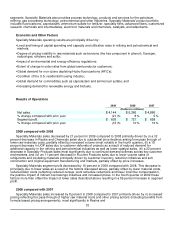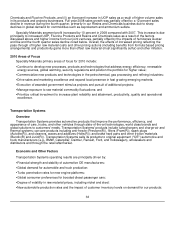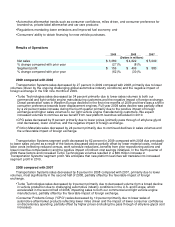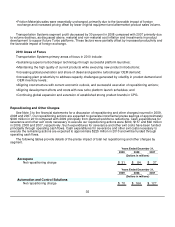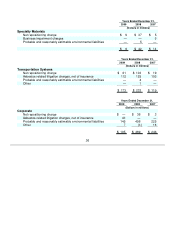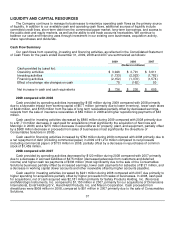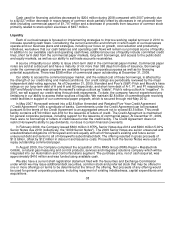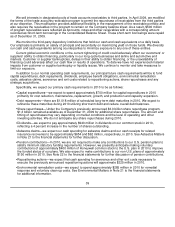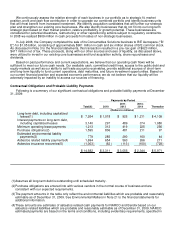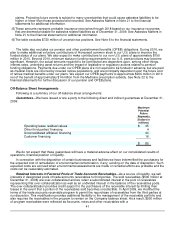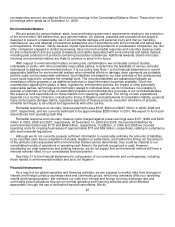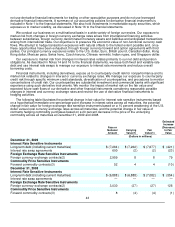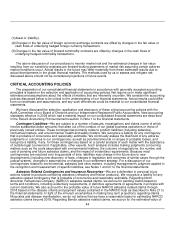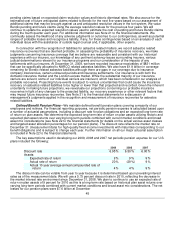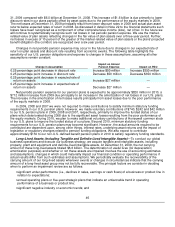Honeywell 2009 Annual Report Download - page 56
Download and view the complete annual report
Please find page 56 of the 2009 Honeywell annual report below. You can navigate through the pages in the report by either clicking on the pages listed below, or by using the keyword search tool below to find specific information within the annual report.
We sell interests in designated pools of trade accounts receivables to third parties. In April 2009, we modified
the terms of the trade accounts receivable program to permit the repurchase of receivables from the third parties
at our discretion. This modification provides additional flexibility in the management of the receivable portfolio and
also requires the receivables in the program to remain on the Company balance sheet. As a result, $500 million
of program receivables were reflected as Accounts, notes and other receivables with a corresponding amount
recorded as Short-term borrowings in the Consolidated Balance Sheet. These short-term borrowings were repaid
as of December 31, 2009.
We monitor the third-party depository institutions that hold our cash and cash equivalents on a daily basis.
Our emphasis is primarily on safety of principal and secondarily on maximizing yield on those funds. We diversify
our cash and cash equivalents among counterparties to minimize exposure to any one of these entities.
Current global economic conditions or the current tightening of credit could adversely affect our customers' or
suppliers' ability to obtain financing, particularly in our long-cycle businesses and airline and automotive end
markets. Customer or supplier bankruptcies, delays in their ability to obtain financing, or the unavailability of
financing could adversely affect our cash flow or results of operations. To date we have not experienced material
impacts from customer or supplier bankruptcy or liquidity issues. We continue to monitor and take measures to
limit our exposure.
In addition to our normal operating cash requirements, our principal future cash requirements will be to fund
capital expenditures, debt repayments, dividends, employee benefit obligations, environmental remediation
costs, asbestos claims, severance and exit costs related to repositioning actions, share repurchases and any
strategic acquisitions.
Specifically, we expect our primary cash requirements in 2010 to be as follows:
• Capital expenditures—we expect to spend approximately $700 million for capital expenditures in 2010
primarily for cost reduction, maintenance, replacement, growth, and production and capacity expansion.
•
Debt repayments—there are $1,018 million of scheduled long-term debt maturities in 2010. We expect to
refinance these maturities during 2010 utilizing short-term debt and reduce overall debt balances.
•
Share repurchases—Under the Company's previously announced $3.0 billion share repurchase program,
$1.3 billion remained available as of December 31, 2009 for additional share repurchases. The amount and
timing of repurchases may vary depending on market conditions and the level of operating and other
investing activities. We do not anticipate any share repurchases during 2010.
•
Dividends—we expect to pay approximately $940 million in dividends on our common stock in 2010,
reflecting a 4 percent increase in the number of shares outstanding.
•
Asbestos claims—we expect our cash spending for asbestos claims and our cash receipts for related
insurance recoveries to be approximately $654 and $62 million, respectively, in 2010. See Asbestos Matters
in Note 21 to the financial statements for further discussion.
•
Pension contributions—In 2010, we are not required to make any contributions to our U.S. pension plans to
satisfy minimum statutory funding requirements. However, we presently anticipate making voluntary
contributions of approximately $400 million of Honeywell common stock to the U.S. plan in 2010 to improve
the funded status of our plans. We also expect to make contributions to our non-U.S. plans of approximately
$150 million in 2010. See Note 22 to the financial statements for further discussion of pension contributions.
•
Repositioning actions—we expect that cash spending for severance and other exit costs necessary to
execute the previously announced repositioning actions will approximate $225 million in 2010.
•
Environmental remediation costs—we expect to spend approximately $285 million in 2010 for remedial
response and voluntary clean-up costs. See Environmental Matters in Note 21 to the financial statements
for additional information.
39



